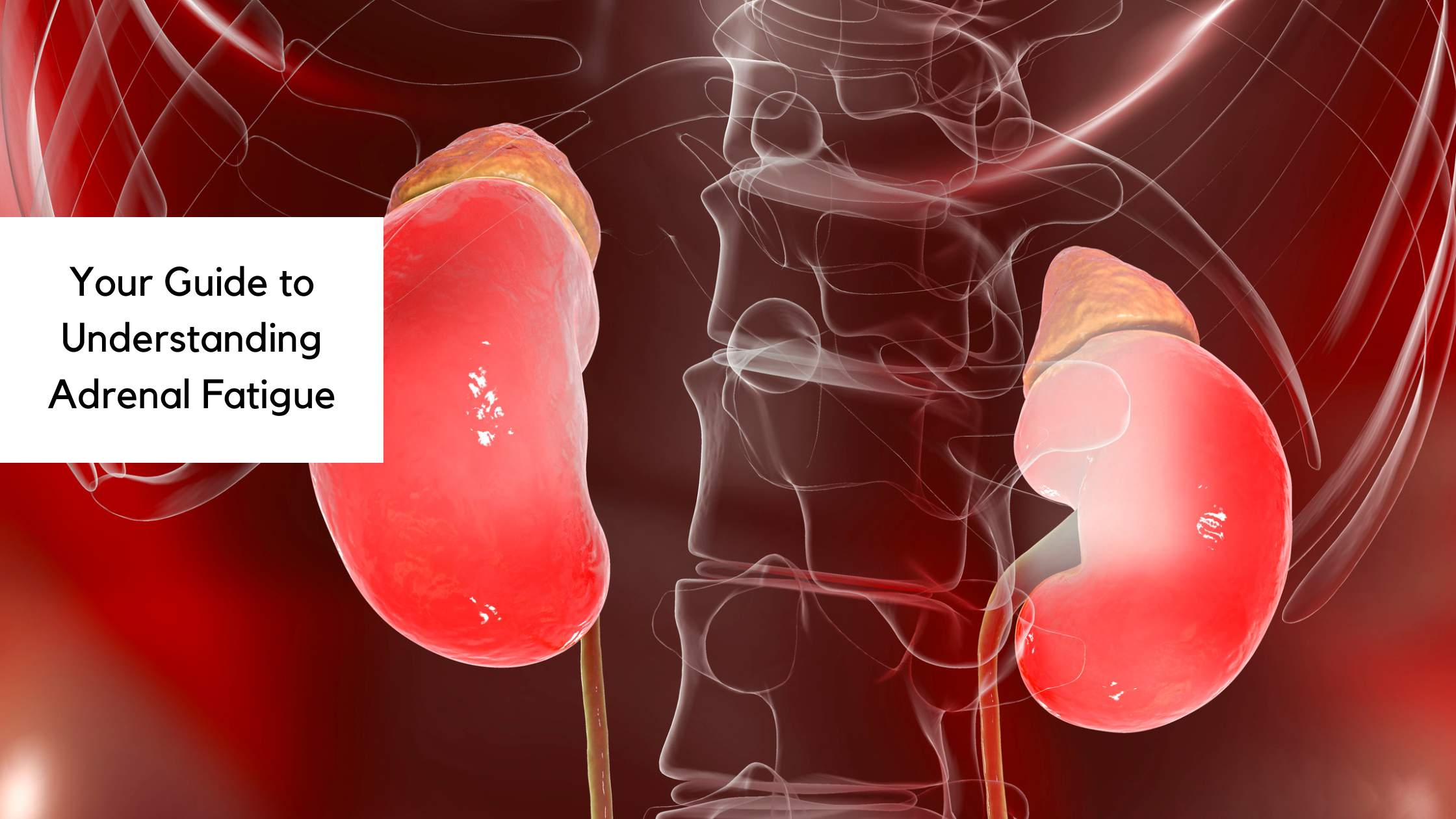Your Guide to Understanding Adrenal Fatigue
Your adrenal glands above each kidney produce both adrenaline and noradrenaline. These glands are vital to the functioning of your body and regulate things such as blood pressure and heart rate.
When your adrenal glands malfunction or become compromised due to another disease or even a procedure or surgery, it can cause further complications, including adrenal fatigue.
What is adrenal fatigue?

Adrenal fatigue is a term used to describe a cluster of symptoms and has not yet provided proof as a true medical diagnosis. Your adrenal glands are primarily responsible for producing hormones such as cortisol, adrenaline, and noradrenaline, which is the body’s way of coping with stress.
When you encounter a lot of stress in your life, and your adrenal glands need to produce more cortisol to manage stress levels, it can lead to some signs and symptoms of adrenal fatigue.
During long-term stress, your body and adrenal glands have difficulty keeping up with the constant need for these hormones. So when this happens, it is often theorized that your body will show the following signs and symptoms of adrenal fatigue.
Symptoms of adrenal fatigue

These symptoms may vary from person to person, and depending on previous medical history and conditions – it’s essential to consult your primary physician if you have concerns about adrenal fatigue or any of these symptoms.
- Body aches
- Unexplained weight loss
- Low blood pressure
- Lightheadedness
- Loss of body hair
- Skin discoloration (hyperpigmentation)
- Trouble falling asleep/waking up
- Salt and sugar craving
- Needing large amounts of caffeine to get through the day
Each individual is different, and how your body reacts to stress and the production of these hormones vary with each person and their unique endocrine system. It is essential to pay attention to any sign that feels abnormal for you – in a healthy individual, normal can mean a few different things, so it is essential to seek the advice of your physician.
Adrenal fatigue vs. adrenal insufficiency
Slightly different than adrenal fatigue is adrenal insufficiency, when your body cannot produce enough of a specific hormone to help the body function, which can cause additional disorders such as Addison’s disease.
Both adrenal fatigue and adrenal insufficiency can cause some of the same symptoms. Without knowledge of any underlying conditions, it can be hard to treat or officially diagnose the cause.
Your diet, nutrition, and exercise greatly impact how your adrenals perform and your adrenal function. Other common health concerns impacting your adrenal function are blood sugar, cortisol levels, immune system, hormones, sleep, diet, supplements, and the overall lifestyle.
Common causes
The most common causes of adrenal fatigue and insufficiency are poor diet, other diseases, or underlying conditions. However, because of its relatively common symptoms, it’s incredibly important to consult medical advice from your doctor to get an accurate health diagnosis and medical condition report.
The term adrenal fatigue is used to cluster the causes and symptoms of adrenal fatigue, but there is no scientific proof that this is a true medical condition, just a term at the moment. That being said, diet, exercise, and your overall health are all extremely important factors when it comes to the symptoms of adrenal fatigue.
How diet affects adrenal fatigue

In terms of your diet and food consumption, there are certain foods you can avoid to prevent adrenal fatigue symptoms and keep yourself healthy and prevent other related chronic diseases from popping up.
Avoiding and or cutting back on caffeine, alcohol, and drugs can significantly lower your symptoms of adrenal fatigue and, in turn, your cortisol levels and how your body handles stress.
In addition to avoiding these beverages, you can cut back and avoid white flour, gluten-containing grains, and added sugar. These foods can affect your endocrine system and the hormones your adrenals produce.
How do I know if I have adrenal fatigue?
The symptoms are often related to other chronic illnesses and diseases. Hence, a diagnosis is not always straightforward, and you should always seek medical advice from your doctor to get a solid confirmation of your symptoms and how to go about treating those symptoms.
Each individual is unique in their health condition. A few tests can be conducted to test a theory and review medical history to gain an accurate picture of the patient and how their symptoms relate.
Medically, there is still no proof that this is a true medical condition, which makes its diagnosis difficult and needs further support and medical resources.
Controversies around Adrenal Fatigue
As we’ve mentioned already, there are a lot of varying opinions, especially in the medical field, around whether adrenal fatigue is “real” and a diagnosable disease. Currently, the term adrenal fatigue is just that, used to describe the combination of symptoms one can experience. There is no scientific or medical proof that this condition is valid.
Adrenal insufficiency is similar and faces the same controversies as adrenal fatigue. There is not enough medical evidence to suggest that it is a condition that requires a diagnosis or if it is just a combination of symptoms brought on by stress and the average level at which your body functions.
As more research is done on the causes, symptoms, and other adverse effects of adrenal fatigue, whether or not it can be classified as a condition or merely a combination of symptoms will continue to evolve.
How is adrenal fatigue treated?

The treatment varies depending on the symptoms’ severity and your doctor’s medical history review. Treatment can range from a simple diet or exercise change – to more in-depth changes such as medication in the instance where your adrenal glands are not making a particular hormone or enough of a hormone.
The best thing you can do is consult your doctor for a treatment plan – many factors go into the function of your body, and some disorders may contribute to other health problems, like adrenal fatigue, that must be addressed first.
You can still reduce your risk or prevent further symptoms by reducing your alcohol intake, changing your diet to incorporate more healthy foods and beverages, and trying to limit the amount of stress in your day. You can also help your body by practicing these routines and getting more sleep each night.
Final Thoughts
Adrenal fatigue is a relatively new field of research and development in the medical field. Your adrenal glands produce certain hormones, such as cortisol, resulting from stress throughout your life and daily routines. When your body gets too stressed, or this stress is prolonged for a period of time, it can lead to adrenal fatigue or adrenal insufficiency.
This happens when your body is either not producing enough of a particular hormone because it cannot keep up or it lacks the production of a specific hormone altogether. There are many factors to consider, and some signs of adrenal fatigue are similar to that of other conditions. So it’s essential to consult your physician to develop a treatment plan.
You can modify your diet, restrict alcohol consumption, and increase exercise and sleep to help prevent adrenal fatigue and help decrease symptoms.







